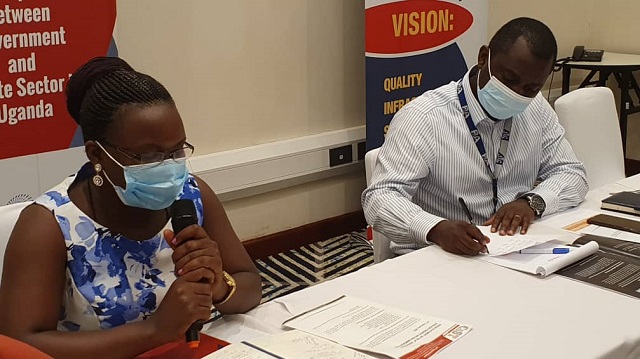
Kampala, Uganda | Julius Businge | As the government continues to put much emphasis on investing in big infrastructure ventures, some members of the public have raised concerns about transparency right from procurement up to completion of projects.
But a new report, the 4th of this nature, published on Feb.12 by CoST Uganda, a transparency and accountability organisation, notes that, the culture of transparency in handling government projects is taking root.
It said, government was partly using the CoST Assurance process as a learning tool to consolidate disclosure practices.
Edwin Muhumuza, the director for corporate affairs at Public Procurement and Disposal of Public Assets Authority (PPDA) welcomed the report saying the success of all government projects requires input from the private sector, public servants, members of the public, civil society organisations and the media.
“Their (projects) success affects all of us,” he said during the release of the report on Feb.12 at Hilton Garden Inn Kampala.
The 4th assurance process focused on 23 public infrastructure projects from eight procurement entities.
The assurance process was spread through the sectors of education, health, water and environment, works and transport.
The procuring and disposing entities that participated in the 4th assurance process included; ministry of education and sports (1 project), ministry of health (3 projects), ministry of works and transport (7 projects), Uganda National Roads Authority (4 projects), ministry of water and environment (1 projects), Wakiso District Local Government (2 projects), National Water and Sewerage Corporation (2 projects) and Kampala Capital City Authority (3 projects).
Olive Kabatwaire, the programme coordinator for CoST Uganda presented the findings.
A total of 22 of the assured projects cost approx Shs 4.6trillion.
More on disclosures
According to the report, disclosure across the 23 projects was at an average of 62%, an increase of 20% from the 3rd Assurance process which was at 42%.
In regards to disclosure trends, proactive disclosure increased from 43 to 55% whereas reactive disclosure tremendously increased from 42% to 70%.
However, across the five phases of project delivery, proactive disclosure staggered with limited data disclosed on project implementation, procurement, completion and preparation.
The report says, physical disclosure along project sites was also insufficient with most of the projects having broken, fallen and others lacked sufficient information walls.
Meanwhile, the report says, there was high foreign dependency for investments in infrastructure development. Loans took 58% for 14 of the 23 projects Assured, whereas GoU contributed 31% and grants amounted to 11%.
It also says there was limited consultations and involvement of lower level stakeholders such as local governments in centrally procured projects resulting into insufficient designs.
In order to close the prevailing gaps, the report recommends that government through PPDA should issue a standard disclosure template for infrastructure projects. This, the report says, should be accompanied with associated guidelines on how data can be disclosed.
It also calls for regular updates of the public disclosure platforms and establishment of internal data management and retrieval systems with the help of National Information Technology Authority-Uganda.
That the Ministry of Finance, Planning and Economic Development through PPDA is encouraged to fast track alignment of the Electronic Procurement Portal (E-GP) and the Government Procurement Portal (GPP) to the OC4IDS to enable full disclosure and categorisation of procurement data.
“PPDA is encouraged to monitor compliance and enforce implementation of the local content and reservation schemes, and train public officials on procurement guidelines,” the report recommends in part.
 The Independent Uganda: You get the Truth we Pay the Price
The Independent Uganda: You get the Truth we Pay the Price


